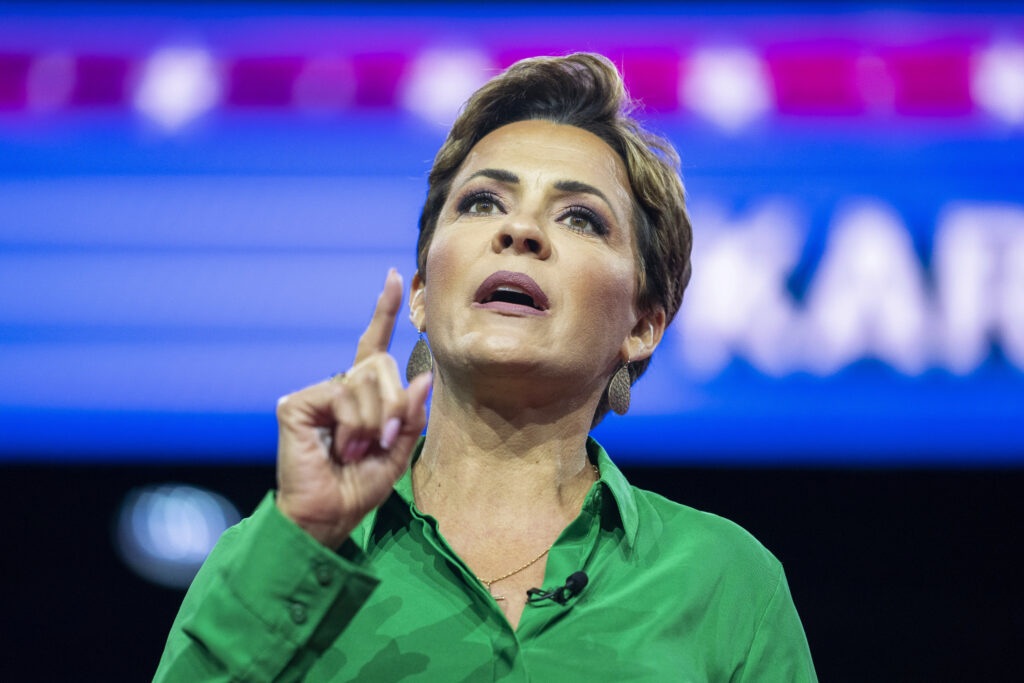Arizona Judge Issues Final Blow to Kari Lake’s Six-Month Election Contest
WASHINGTON, D.C. — On Monday, May 22, an Arizona judge issued the final blow to Republican election denier Kari Lake’s six-month election contest that challenged her loss to Gov. Katie Hobbs (D) in the 2022 Arizona gubernatorial race.
In his order dismissing Lake’s sole remaining claim, Judge Peter Thompson found that there was no evidence of misconduct under Arizona law. Additionally, Thompson held that Lake’s allegations of misconduct did not affect the results of the election.

Lake not only lost her election for Arizona governor by over 17,000 votes, but also consistently lost at three separate court levels in the six months since Election Day. In December 2022, the trial court dismissed eight of Lake’s 10 claims and then, after trial, dismissed the remaining claims, thereby ending the contest. The Arizona Court of Appeals affirmed the trial court’s dismissal and the Arizona Supreme Court denied review of six of the seven claims in Lake’s appeal. Following this ruling, the state Supreme Court sent one claim back to the trial court for further review, which was the subject of a new trial that took place from May 17-19.
To prevail at her second trial, Lake had to prove that signature verification did not occur in Maricopa County during the 2022 election. In Arizona, voters who cast an early mail-in ballot must sign an affidavit attesting to their identity; this signature is then compared to prior signatures in the voter’s record to confirm a match. Specifically, Lake had to demonstrate that Maricopa County did not conduct signature verification at stage 1, 2 or 3 and prove that this failure affected enough ballots to change the outcome of the election.
At her second trial, Lake’s arguments were as deeply flawed and unserious as during her first trial. Her star witnesses — or as Lake calls them, “whistleblowers” — included members of a fringe political action group partially funded by conspiracy theorist Mike Lindell and a person who conducted signature verification during the 2022 midterm elections, the very process Lake had to prove did not occur.
Jacqueline Onigkeit, one of Lake’s witnesses who did signature verification during the 2022 midterms, spent almost an hour explaining the training required to do signature verification as well as the intricacies of the process itself. Onigkeit explained: “I was very focused on verifying signatures, doing the right job and making sure whether or not the signature matched.”
Onigkeit also highlighted the level of scrutiny to which the signature verifiers were held. “We were informed several times…that we were being audited every day. And if we were approving too many signatures or rejecting too many signatures, we’d be pulled into the office, get a warning, and if it happened a second time, we’d be let go,” she explained.
In the order dismissing Lake’s contest, Judge Thompson found that Onigkeit’s “testimony makes abundantly clear that level one and level two signature review did take place in some fashion,” refuting Lake’s allegations.
The order concluded with three findings and once again confirmed the election of Katie Hobbs as the governor of Arizona.
- “The Court DOES NOT find either clear and convincing evidence or a preponderance of evidence of misconduct in violation of [Arizona law].”
- “The Court DOES NOT find either clear and convincing evidence or a preponderance of evidence that such misconduct was committed by ‘an officer making or participating in a canvass’ under [Arizona law].”
- “The Court DOES NOT find either clear and convincing evidence or a preponderance of evidence that such misconduct did in fact affect the result of the 2022 General Election by a competent mathematical basis.”
This six-month election contest was fueled by fringe conspiracies from the beginning and Lake’s attorney (who might be remembered by his stint representing the controversial Cyber Ninjas during Arizona’s 2020 election “audit”) was even sanctioned by the Arizona Supreme Court for false claims. In an order granting sanctions, the high court held: “Because [he] has made false factual statements to the Court, [the Arizona Supreme Court] conclude[d] that the extraordinary remedy of a sanction…is appropriate.”
Today’s ruling is a victory for voters, especially those in Arizona, as Lake’s election contest has finally come to a long-awaited end. While it is a relief that Lake’s conspiracies did not hold up in the courtroom, it is an unfortunate reality that this type of election denialism is chipping away at our democracy every time someone like Lake spreads misinformation.
According to our data, Arizona was a hotbed for election litigation in 2022 with a whopping 35 lawsuits filed in the state. This litigation ensued in large part due to voter suppression and election subversion attempts that threatened the rights of voters in the Grand Canyon State.
From GOP-sponsored voter suppression laws to a small Republican county illegally attempting to hand-count ballots and refusing to certify election results to right wing vigilante groups intimidating voters in front of drop boxes to Kari Lake, Mark Finchem and Abe Hamadeh’s election denialism: it is clear that although Lake’s contest is finally over, democracy remains on the docket.